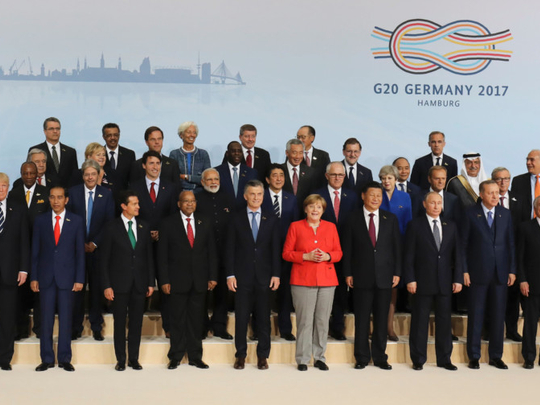
In 2017, the G20 is a group with more inner conflicts than points of agreement. That makes the summit in Hamburg, a minefield for the host, German Chancellor Angela Merkel. Merkel has enjoyed poll bumps out of previous high-level meetings. This time around, however, she’s more interested in containing the hot tempers and animosities than in advancing any kind of common agenda, so the summit will likely be defined by what won’t happen rather than by what will. Here is why there is no consensus on the following:
Breakthrough on trade
Even though Merkel said recently that it was her goal to have the G20 send “a clear signal for free markets and against protectionism, as well as a clear commitment to a multilateral trade system,” that won’t be possible because of the presence of United States President Donald Trump, who shows an unwavering commitment to his protectionist election promises and who has an issue with Germany’s trade surplus with the US. Most other leaders at the summit are pro-trade, so Trump’s allies, surprisingly, will be outside the meeting hall, among the 8,000 demonstrators who have already clashed with the 20,000 police who have flooded Hamburg for the duration of the leaders’ talks.
German Foreign Minister Sigmar Gabriel said that a trade war could break out between the US and the European Union (EU). He called on the sides to talk to each other to prevent it, but they’ve talked before and that didn’t get them anywhere. Japanese Prime Minister Shinzo Abe visited Brussels to sign a political agreement that resolves most of the outstanding issues for a massive EU-Japan trade deal. The negotiations, which had dragged on for years, sped up after Trump pulled the US out of the Trans-Pacific Partnership.
Progress on climate change
Since the US withdrew from the Paris Agreement, other large countries have restated their commitment to it, but without Trump’s consent, it’s hard to imagine what statement the G20 leaders could make together. It might help some leaders at home to be seen to be standing up to Trump at the summit, but there’s no point in recording the obvious disagreement in the final declaration.
Anything substantive to come out of the meeting between Trump and Russian President Vladimir Putin
Trump arrived in Hamburg from Poland, one of the few European countries these days where he could expect a warm welcome because the nationalist Polish government came to power using similar rhetoric. The Poles have primed Trump against trying to be friendly with Putin by promising to buy the US-made Patriot missile defence system and seeking a long-term deal for the supply of US liquefied natural gas to break Poland’s dependency on Russian energy imports. Jobs and trade advantages are major issues for Trump, and Putin cannot offer as much as the Polish government can.
Besides, Trump has to be careful not to look too soft on Russia because of the bipartisan domestic criticism he faces when that happens. The meeting with Putin was watched by eagle-eyed commentators for any incriminating sign of friendliness. I doubt Putin will try to flatter or otherwise manipulate Trump, given the meeting’s uncomfortable context: He’ll probably be opaque and non-committal, not giving an inch on Syria or Ukraine, the two likely subjects of discussion. Cautious encouragement in the trade and climate conflicts with Europe is on cards: A rift between the US and the EU is one of Putin’s fondest goals.
Anything noteworthy on migration
It’s on the summit’s agenda, but good luck hammering out a common position given Trump’s stance; the dictates of Brexit for United Kingdom. Prime Minister Theresa May; the distress of Italian Prime Minister Paolo Gentiloni, whose country has problem handling a growing influx of African migrants from across the Mediterranean; and the bitterness of Turkish President Recep Tayyip Erdogan, who thinks the EU has short-changed Turkey for its help in resolving the 2015-2016 refugee crisis. EU interior ministers meeting in Tallinn offer only slightly better chances of progress.
Emergence of Europe as the new global beacon
China’s President Xi Jinping is in the same camp as the EU on trade and climate change, and Trump is unhappy with what he considers Xi’s insufficient efforts to dissuade North Korea from pushing forward with its nuclear programme. But China also has just agreed to issue big loans to two Russian government-controlled entities that are under US sanctions. Abe has made a point of staying on a friendly footing with Trump, offering him help with North Korea. India’s Prime Minister Narendra Modi has tried to be everybody’s friend, avoiding rifts with both Trump and Putin.
The dynamics at the Hamburg summit make the G20 a less-efficient group than ever before. The final declaration is well-meaning sentences about global health, digitalisation, gender equality, African development and barriers to the financing of terrorism, but in a world that’s increasingly multipolar and shaped by bilateral deals and shifting multilateral configurations, the list of things on which all leaders can agree is shrinking. Born of the global financial crisis, which demanded concerted action from the global leaders, the G20 format is losing relevance, useful largely as a convenient forum for bilateral meetings, like the one between Putin and Trump.
Merkel and Hamburg residents alike, faced with a citywide lockdown, are already waiting for the hyped-up meeting to be over.
— Bloomberg
Leonid Bershidsky is a Bloomberg View columnist.








